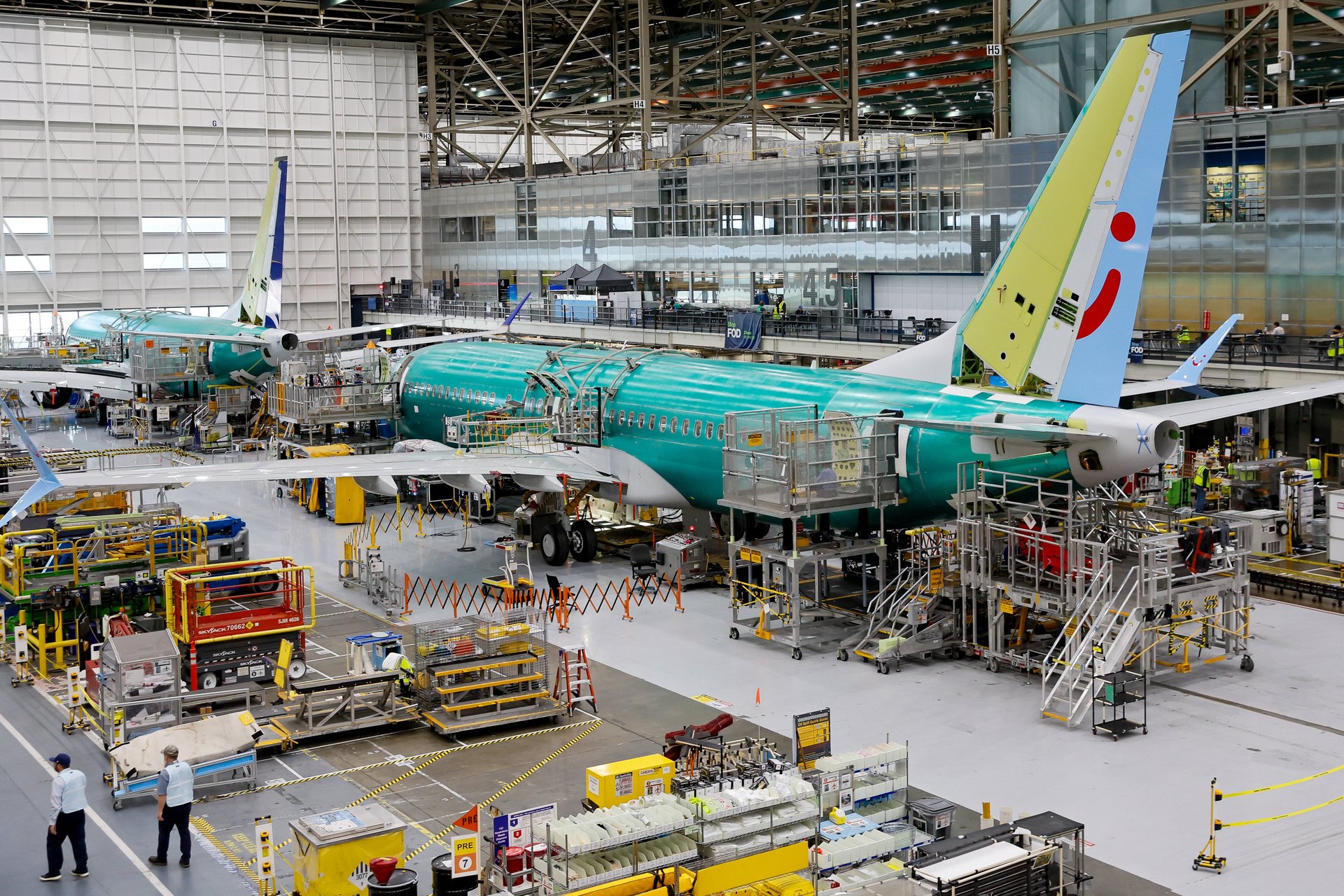Boeing is about to get 'aggressive' in building more 737 Max planes
Suppliers aren't sure about the plans, but the jets are a cash cow for the troubled plane maker

After a particularly difficult 2024, Boeing (BA) is looking to hit the ground running next year. Aviation news site The Air Current reports that the planemaker is telling suppliers that it will be “aggressive” in hitting maximum production speed by summer.
Suggested Reading
“As we methodically resumed 737, 767 and 777/777X production, we updated our production schedules for those programs,” Boeing said in statement provided to Quartz. “We continue to work closely with our suppliers, on a part-by-part basis, to support our production plans. We are also in close contact with our customers about the timing of their deliveries. We will continue to steadily increase production as we execute on our Safety and Quality Plan and work to meet the expectations of our regulator and customers.”
Related Content
After a door plug blew out on a 737 Max 9 in January, the Federal Aviation Administration mandated that Boeing slow down on how many of the planes it makes, limiting the company to 38 of the model per month. On top of the FAA speed limit, which has been accompanied by a dramatic increase in scrutiny and boots-on-the-ground inspections for safety and quality-control issues, 737 Max production crawled to a halt during a nearly two-months-long strike by the company’s union-represented machinists as they worked out a new collective bargaining agreement.
Getting to 38 planes per month might be a challenge. Using 737 Max deliveries as a rough gauge of production — planes might not be immediately delivered after they roll off an assembly line — Boeing hasn’t hit that number since December of last year, when it sent 44 of the planes to customers. However, that was under an old manufacturing regime, one that saw the jets put together using a skip-step manufacturing process that regulators believe may have contributed to this year’s door plug blowout.
An unnamed source at an unnamed supplier told the Air Current that Boeing’s timeline is “incredibly aggressive, probably unrealistic.” Though outgoing FAA Administrator Mike Whitaker complimented Boeing’s commitment to a more sure-footed manufacturing process, noting that the aviation giant is “focused on their workforce, the training, making sure they have the supply chain sorted out,” it still took the company a month to restart 737 Max production following the ratification of the machinists’ new contract.
Before the strike (and its effects on production capacity), Boeing reportedly told suppliers to “keep your foot on the gas” in preparation for new work. Stephen Oswald, the CEO of engine parts maker Ducommun (DCO), noted on a recent earnings call that Boeing’s stop-and-start 737 Max manufacturing has been physically manifesting at the factory of embattled fuselage supplier Spirit AeroSystems.
“If you go to Wichita, you look at Spirit, and you look at all the fuselages that are stacked up, there used to be like 90 of them maybe,” he said. “Now, it is like 150 fuselages.”
Whatever the outcome, Boeing’s most recent 737 Max production push is not happening in a vacuum. Despite its checkered history — the company has been weathering legal difficulties from a pair of fatal 737 Max 8 crashes in 2018 and 2019 — airlines really want the planes because they have better fuel economy than other models. Of Boeing’s outstanding order book, 77% of its 5,400-plane backlog is comprised of 737 Maxes.
Carriers like Delta Air Lines and United Airlines have been waiting on 737 Max 10 — the largest version of the plane but one that has faced significant regulator certification delays — for so long that complaints about the jets are a frequent topic of earnings calls and securities filings. Despite this, Turkish budget carrier Pegasus Airlines just put in an order for as many as 200 of them.
“As low-cost carriers continue to boost regional growth and connectivity, the 737-10 will support Pegasus Airlines in reaching new markets across Europe, the Middle East, Central Asia and Africa,” Boeing said in a statement announcing the new business, adding that its “Commercial Market Outlook forecasts European and Central Asian operators will take delivery of nearly 7,900 single-aisle airplanes over the next 20 years.”